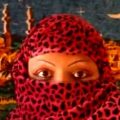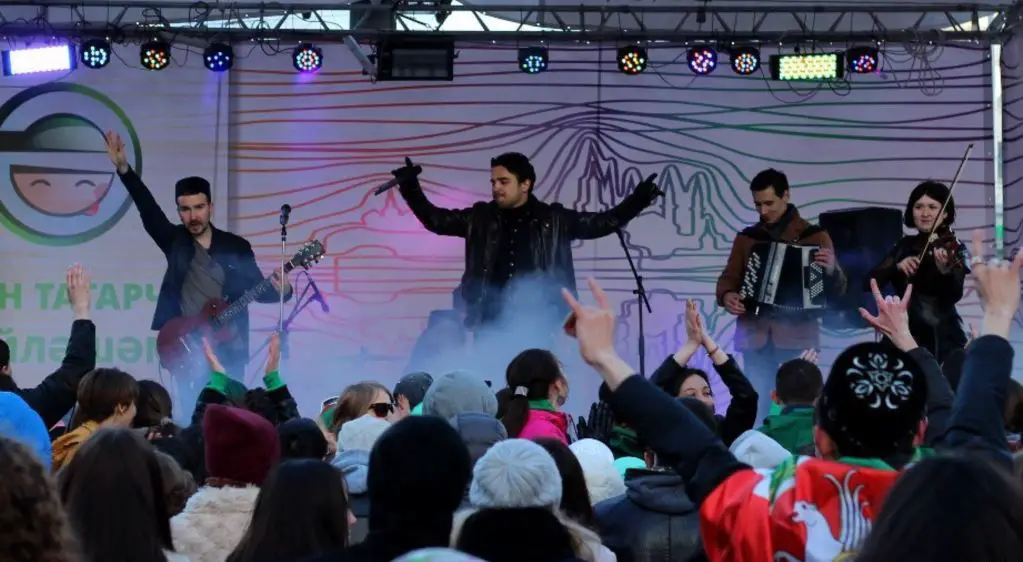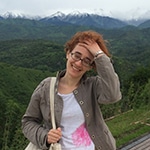Dilya Nigmatullina (Диля Нигматуллина) is a Tatar singer of pop music. Though she has fewer albums to her name than some of her Tatar pop contemporaries, she has a loyal following and is pretty well known in the small Tatar pop world.
Nigmatullina actually grew up not in Tatarstan but in the Russian republic of Mari El (Марий Эл), which borders Tatarstan. Nigmatullina couldn’t attend a music school, as there wasn’t one where she lived, but she participated in the music ensemble White Sails (Ак җилкәннәр) during her school years, along with her brother, Bulat Nigmatullin, who is also a popular Tatar pop singer.
She then studied economics at university, but continued her musical activities, including participating in contests and touring with White Sails. In 1999 she won first place in the Ягымлы яз musical festival (a celebration of Tatar folk culture) in Kazan. After that, she gave up on economics to follow her musical passion, and transferred to the Kazan State University of Culture and Arts (where she met her friend, fellow singer Albina Apanaeva).
From there on, there was no looking back. She participated in, and won, more contests and festivals, including the prestigious Tatar Song (Татар җыры) festival in Kazan. She then signed with Bars Records, one of the biggest names in Tatar music production. Her voice has been described as having a “velvet, gentle timbre,” and Kaef.ru notes that “today she is the only one among young Tatar singers who does not have a single failure in her repertoire—literally every one of her songs is a hit.” The site also notes that she was the first Tatar singer to touch the subject of “female loneliness.” Nigmatullina is still performing concerts today.
Nigmatullina’s rendition of the Tatar song “Мәк чәчәге”:
Lyrics for “Мәк чәчәге”:
Мәк чәчәге, мәк чәчәге,
Мәк чәчәге ал була.
Үзең сирпеп бер карасаң
Йөрәгемә ял була.
Мәк чәчәге, мәк чәчәге,
Мәк чәчәге ал-көрән.
Күкрәгемдә җаным ничек,
Мин сезне шулай күрәм.
Дустым, алай дисеңме,
Дустым, болай дисеңме?
Син дә дустым, минем кебек,
Уф, йөрәгем, дисеңме?!
Уф дияргә ярамый,
Уф дияргә ярамый.
Янган йөрәк яна икән
Уф дигәнгә карамый.
Мәк чәчәкләре сибелә
Давылларда, җилләрдә.
Мәк чәчәгедәй сибелдек
Киткәч туган җирләрдән.
“Син булсан”:
Lyrics for “Син булсан”:
Гел бәхетле булып булмый
Бик бихетсез көннәр бар.
Мендәр читен юешләтеп
Елап чыккан төннәр бар.
Кушымта:
Син минем янымда булсаң
Бар кайгылар чүп кенә.
Май кояшы кебек көләм
Бер кочаклап үп кенә.
Кешеләр дә төрле-төрле,
Кара мәче юл кисә.
Җаннарымны өшеттереп
Зәхәр телле җил исә.
Тормыш юлы сикәлтәле
Таулар да бар, упкын да.
Кая барырга да белми
Йөзгәнем бар дулкында.











